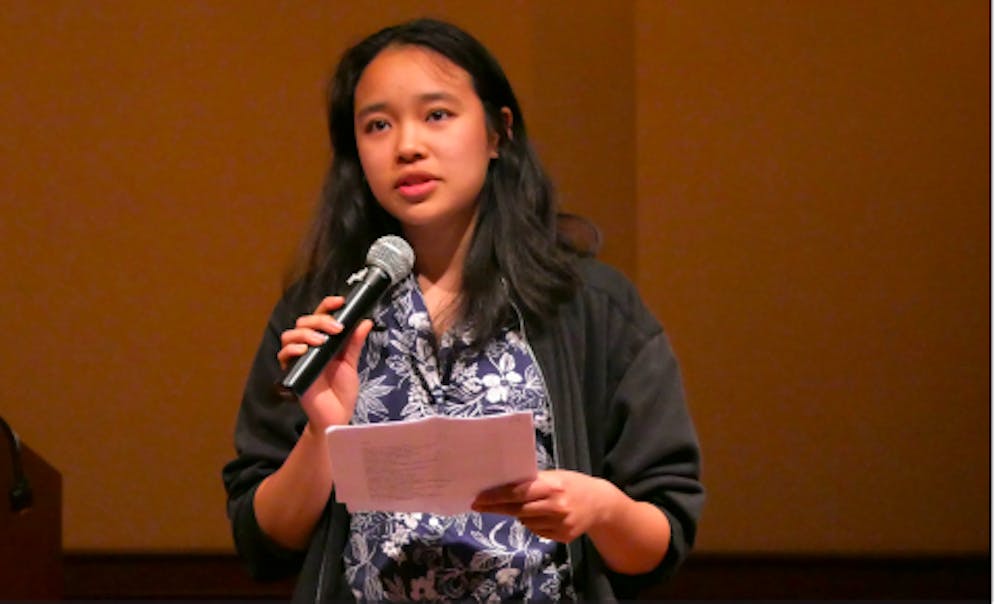By Kelly Scheper
Staff Writer

Words and symbolism flowed through the library as INK, the College’s creative writing club, presented its Spring 2019 Student Reading Series on Thursday, April 25 at 8:30 p.m. in the library auditorium. Senior English major and co-president of INK Alyssa Doyle announced the four student poets –– Emily Miller, Artemis Fraine, Jessica Shek and Kelly Vena.
Jessica Shek, a sophomore English and secondary education dual major, opened the event with her love poem, “You There.” The poem was written in computer coding language, using words such as “parentheses, semi-colon, bracket,” which added richness and an odd sense of clinical distance between the audience member and the piece.
Emily Miller, a senior English major, performed an untitled prose that discussed contemporary artists such as Andy Warhol and detailed her grandmother’s paintings.
“A lot of poetry I write can be abstract, but these little stories I read were kind of concrete in the subject matter,” Miller said.
Much of their poetry focused on disability, gender and sexuality.
Artemis Fraine, a sophomore women’s, gender, and sexuality studies major, performed poems called “Nightly Routine,” “Adventures in Dissociation” and “Heaven.” Although Fraine recited “Heaven” herself, it was from the perspective of a young girl who told her mother she wanted to marry a woman on their way to church.
Kelly Vena, a senior English major, was the final performer. Her work was a collection of nine poems called “The Blue Collar Diaries,” and a poem about sophomore math major Michael Sot, who died in the December 2018 car crash near campus.
Vena’s “The Blue Collar Diaries” includes poems that detail her opinion on the legal obligations and the hard realities of holding a blue collar job, such as the hardships her father and grandfather faced as plumbers.
In the Michael Sot poem, Vena talked about how the excessive beeps of her microwave were an unpleasant reminder of the beeps from the car horns likely heard at the time of the car crash. She wrote about how, just like there are too many unnecessary beeps, there are also too many unnecessary drunk driving crashes. She wrote about just like one day a microwave will beep less excessively, so too might there be a day where there are fewer drunk driving incidents.
“The number of beeps from a microwave are excessive and unnecessary,” she read. “The number of drunk driving deaths are excessive and unnecessary. I guess those are two numbers we have to live with for now.”
However, the warmth of the microwaved food reminded her of the warmth that Sot shared with the lives of his loved ones.
“What I am not displeased with, however, is a microwave’s warmth,” she continued. “I like hot food better than cold, so I appreciate a microwave’s magic. I understand your beeping that night had to be done. I just wanted you to know that your warmth has been felt by everyone exposed to you.”
Vena prefers poetry to narrative writing and her creative process consists of thinking of a line or stanza first and then filling in the blanks. The majority of the poets preferred poetry to other styles of writing such as narratives, and their skill with the written and spoken word was prominent that evening amongst the auditorium’s audience.
“With poetry, everything you want to say is wrapped up in a neat little bow really quickly,” Vena said.







